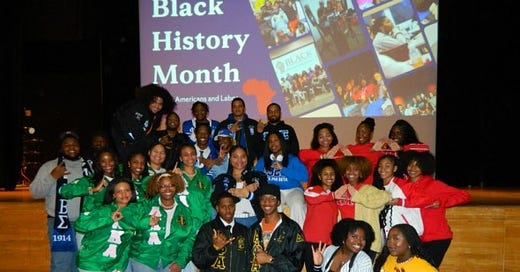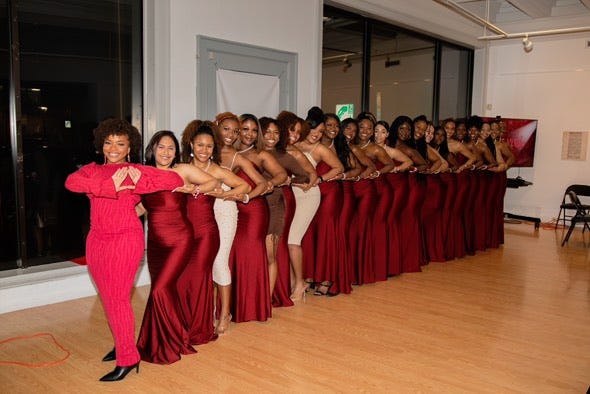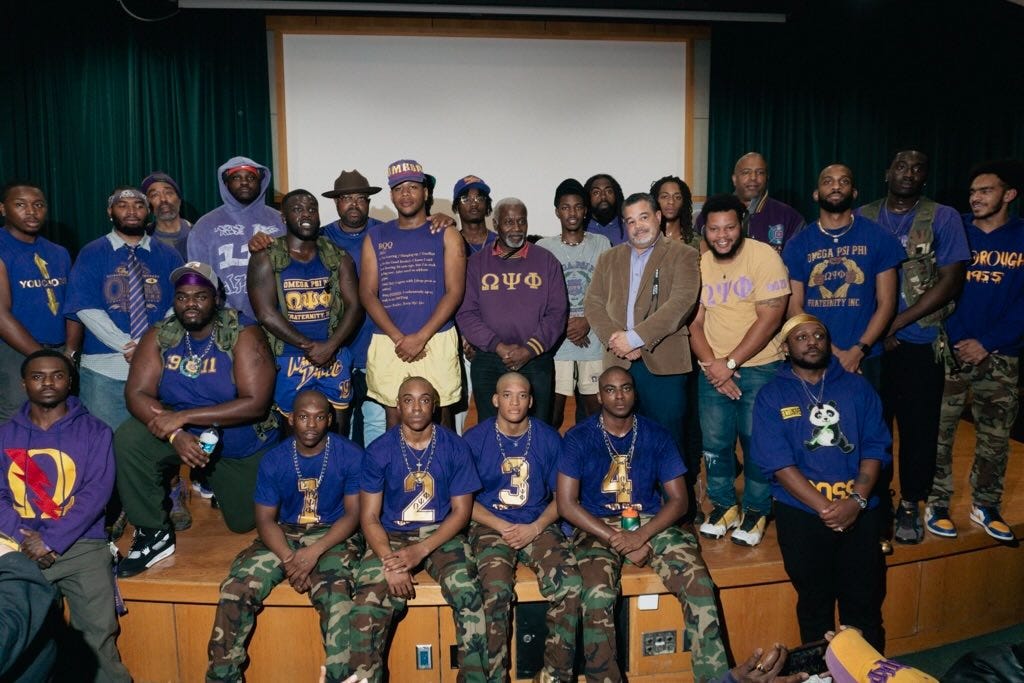The Influence of the Divine Nine at Syracuse University
Breaking Down Stereotypes and Embracing Diversity at a Predominantly White Institution. By Gabrielle Bryant and edited by Eda Uysen
The National Pan-Hellenic Council (NPHC), also known as the Divine Nine (D9) is famously known as a collective of nine historically Black sororities and fraternities that have paved the way for many cultural, social, and academic contributions, both within the Black community and broader society. These Black greek lettered fraternities and sororities include (in order of founding dates): Alpha Phi Alpha Fraternity, Inc. (1906), Alpha Kappa Alpha Sorority, Inc. (1908), Kappa Alpha Psi Fraternity, Inc. (1911), Omega Psi Phi Fraternity, Inc. (1911), Delta Sigma Theta Sorority, Inc. (1913), Phi Beta Sigma Fraternity, Inc. (1914), Zeta Phi Beta Sorority, Inc. (1920), Sigma Gamma Rho Sorority, Inc. (1922) and Iota Phi Theta Fraternity, Inc. (1963).
Although the Divine Nine is widely recognized as a prestigious and goal-oriented group of Black men and women, social media platforms like TikTok and Instagram have complicated the narrative. With assumptions and stereotypes spreading rapidly online, it can be difficult for outsiders to distinguish between stereotypes and reality. While some representations capture the joy, pride, and unity of Black fraternities and sororities, others can perpetuate stereotypes, reducing them to simple caricatures or misunderstandings. These stereotypes include the Divine Nine being labeled as ghetto or unprofessional. These portrayals can encourage biases, overlooking the rich diversity that exists within each organization.
To learn more about this issue and the effect it holds on college students affiliated with the Divine Nine, I had the opportunity to meet three members of the Council, diving into how social media impacts the perception of the D9 and why it's important to appreciate the unique culture of each chapter.
For Catherine Holguin, a junior majoring in information management and technology with a concentration in project management, the influence of social media is undeniable.
"Many don’t understand the root of it, everything moves with purpose at Syracuse for the National Pan-Hellenic Council,” said Catherine Holguin, VP of the NPHC and Corresponding Secretary of the Kappa Lambda Chapter of Delta Sigma Theta, Inc.
However, unlike many of her peers, Holguin experienced first-hand the acts of service Delta women take part in– her aunt is a member of the sorority.
“Between seeing my aunt, her chapter at a young age and the Deltas on campus showing their acts of scholarship and service, it’s something that definitely stood out to me as a Black woman,” Holguin said. “They weren’t just talking about it—they were living it.”
Members of the Delta Sigma Theta Sorority Inc Photographed at an event.
Holguin explained that while social media can amplify visibility, it often oversimplifies the narrative surrounding Greek life, especially the National Pan-Hellenic Council (NPHC). The online spotlight tends to focus on eye-catching events, popular strolls, or aesthetic appeal, while overshadowing the deeper values that shape these historic Black organizations.
“A lot of assumptions that we are demonic either come from somebody that has had a bad experience, or somebody that may not align with it,” Holguin said. “Everyone has their different perspectives, but at the end of the day, the NPHC— here at Syracuse —exists to uplift the Black community and push each other to grow.”
What’s often left out of mainstream narratives is the unwavering commitment to community service, the deep bonds of sisterhood, and the emphasis on scholarship and personal development. For Holguin, that’s where the true heart of Delta Sigma Theta Sorority, Inc—and the Divine Nine more broadly—lies.
“These women are hardworking, scholarly, and driven by purpose,” she added. “They’re constantly lifting each other up, whether it’s through mentorship, academic excellence, or making an impact through volunteer work. It’s not just about being a part of something—it’s about giving back and creating a legacy of strength and support.”
Members of the Delta Sigma Theta Sorority Inc Photographed at Syracuse University.
This legacy is rooted in the Divine Nine’s core principles: to serve the community, foster unity through sisterhood and brotherhood, and empower one another through education, leadership, and collective action.
In contrast to Holguin’s experience, I had the opportunity to talk to AliJah Clark, social media chair of the Kappa Chapter of Omega Psi Phi Fraternity, Inc., and sophomore majoring in Psychology. Unlike Holguin, who grew up surrounded by the D9, Clark’s introduction to the Divine Nine began at Syracuse University.
“The only thing I saw on social media about the D9 at first was hops and strolls. I didn’t really know much about Greek life before I got here. It seemed like a bunch of people who wanted to make the community better and be a part of something bigger than themselves. I liked that,” Clark shared.
Having attended predominantly white schools both as a child, and now as a young adult, Clark knew that joining the D9 would offer him a unique aspect of Black brotherhood that he felt was important. However, once he became a part of the D9, he began to notice some challenges seen on social media.
Members of the Omega Psi Phi Fraternity, Incorporated photographed at an event.
“Although social media has its pros and cons, sometimes the media tries to put organizations against each other, as if it’s some kind of gang war—when really, it’s not like that at all,” Clark said. “The other side is that people tend to lump everyone from one organization together. They can associate me with another member that I don’t even know. Everything is chapter-specific. And at the end of the day, everyone is a person, besides the letters they wear. People are individuals,” Clark explained.
This statement sheds light on a broader issue within Greek life perceptions, especially within historically Black organizations. While the Divine Nine fosters unity, pride, and cultural tradition, misconceptions perpetuated by social media can distort the reality of Greek life. Clark’s experience underscores the importance of seeing members as individuals first—each with their own story, values, and reasons for joining—rather than reducing them to stereotypes or assuming uniformity across chapters. His perspective highlights the nuance and depth behind the letters, showing that these organizations are not monoliths, but diverse communities bound by shared values and a commitment to service and growth.
Members of the National Pan-Hellenic Council (NPHC) at a Syracuse University event.
Lastly, I had the opportunity to talk to Alexis Rouson, the NPHC social media chair and the first VP of the Kappa Lambda Chapter of Delta Sigma Theta Sorority, Inc. Rouson is a junior majoring in exercise science and joined Delta Sigma Theta Sorority, Inc, in her sophomore year of college, due to her desire to have this opportunity.
“I wanted to seize the opportunity while I had it because you never know when you're going to see it again.”
Although Rouson grew up in an environment where Greek life was present, it was mainly from another sorority, she said.
“Most of my family members are Alphas and Akas, I took a completely different route than people expected me to. But so many of the women I looked up to are Deltas, the quality of Delta women just being hardworking, really forward thinking, and strong was something that I wanted to lean into and characteristics I already had in myself and wanted to strengthen those,” Rouson said.
By becoming the first woman in her family to join Delta Sigma Theta, she was able to experience a new side of the D9.
Her first exposure to the Deltas was at Syracuse University and social media. Social media provides easier access for people to view D9 content to see what each chapter is doing. Rouson explained that there are both “good and bad” to this level of exposure that they have now.
“The exposure is there for good reasons, but we also see it for the bad reasons as well, and a lot of times people don’t see the full glimpse of what these organizations are when they hear denouncing stories or the negatives of greek life,” said Rouson. “Especially in the D9 people tend to focus more on the bad than the good which is unfortunate, but when social media is used to show the good sides of it, it can be very good as well.”
Rouson’s insight highlights social media as a powerful tool that can either uplift or undermine the perception of Black Greek-letter organizations. While platforms like Instagram and TikTok make it easier to showcase events, community service, and academic success, they can also amplify moments of controversy or misinformation.
Her experience reflects a growing need to balance transparency with intention—ensuring that the public sees the full picture of what the Divine Nine stands for: excellence, integrity, community uplift, and deep-rooted legacy. As more members like Rouson use their voices and leadership roles to share authentic stories, they help reclaim the narrative and highlight the everyday impact of these historic organizations.
Social media captures both the positive representations and stereotypes of the D9. Yet, through the experiences of the people I’ve interviewed—Catherine Holguin, AliJah Clark, and Alexis Rouson—it’s clear that the D9 is far more than what is depicted on TikTok or Instagram. Each chapter is unique, with its own traditions, values, and ways of impacting the community. While social media posts show moments of celebration, they rarely reflect the depth of service, leadership, and brotherhood/sisterhood that these organizations represent. It’s essential to recognize that while online exposure can be powerful, it doesn’t always show the full picture of what the D9 is truly about.







